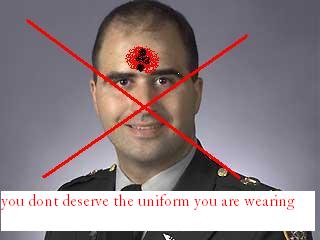Categories: General Tags:
Really,who cares if this guy is not allowed to pray in Arabic…
 He is guilty as hell and he has a meeting with the otherside so let’s set it up for him and on the fast track..He wanted to be a martyr, so let him be one but at the hands of our Military Firing Squad after we give him a good bath in pig’s blood…
He is guilty as hell and he has a meeting with the otherside so let’s set it up for him and on the fast track..He wanted to be a martyr, so let him be one but at the hands of our Military Firing Squad after we give him a good bath in pig’s blood…
He went on a shooting spree and killed and wounded our service men and women. He desires no mercy..He wanted to be killed and he messed up and lived…
Here is his “sad” story…
SAN ANTONIO, Texas — A defense attorney for the Army psychiatrist charged in the deadly shooting at Fort Hood says the Army has prohibited his client from praying in Arabic with his family.
Attorney John P. Galligan said police stopped a phone conversation between Maj. Nidal Malik Hasan and one of his brothers Friday because it was not in English. Galligan told the San Antonio Express-News on Monday that police at Brooke Army Medical Center in San Antonio refused to let Hasan pray in Arabic from the Quran with his brother.
The attorney says he thinks that’s illegal and violation of religious rights.
and the link
http://www.foxnews.com/story/0,2933,580870,00.html?loomia_ow=t0:s0:a4:g4:r1:c0.000000:b0:z5
Categories: General Tags:
Holiday Eating Tips
1. Avoid carrot sticks. Anyone who puts carrots on a holiday buffet table knows nothing of the Holiday spirit. In fact, if you see carrots, leave immediately. Go next door, where they’re serving rum balls.
2. Drink as much eggnog as you can. And quickly. It’s rare.. You cannot find it any other time of year but now. So drink up!
Who cares that it has 10,000 calories in every sip? It’s not as if you’re going to turn into an eggnog-alcoholic or something. It’s a treat. Enjoy it. Have one for me. Have two. It’s later than you think. It’s Christmas!
3. If something comes with gravy, use it. That’s the whole point of gravy. Gravy does not stand alone. Pour it on. Make a volcano out of your mashed potatoes. Fill it with gravy. Eat the volcano. Repeat.
4. As for mashed potatoes, always ask if they’re made with skim milk or whole milk. If it’s skim, pass. Why bother? It’s like buying a sports car with an automatic transmission.
5. Do not have a snack before going to a party in an effort to control your eating. The whole point of going to a Holiday party is to eat other people’s food for free. Lots of it. Hello?
6. Under no circumstances should you exercise between now and New Year’s. You can do that in January when you have nothing else to do. This is the time for long naps, which you’ll need after circling the buffet table while carrying a 10-pound plate of food and that vat of eggnog.
7. If you come across something really good at a buffet table, like frosted Christmas cookies in the shape and size of Santa, position yourself near them and don’t budge. Have as many as you can before becoming the center of attention. They’re like a beautiful pair of shoes. If you leave them behind, you’re never going to see them again.
8. Same for pies. Apple, Pumpkin, Mincemeat. Have a slice of each. Or if you don’t like mincemeat, have two apples and one pumpkin. Always have three. When else do you get to have more than one dessert? Labor Day?
9. Did someone mention fruitcake? Granted, it’s loaded with the mandatory celebratory calories, but avoid it at all cost. I mean, have some standards.
10. One final tip: If you don’t feel terrible when you leave the party or get up from the table, you haven’t been paying attention. Re-read tips; start over, but hurry, January is just around the corner. Remember this motto to live by: “Life should NOT be a journey to the grave with the intention of arriving safely in an attractive and well preserved body, but rather to skid in sideways, chocolate in one hand and wine in the other, body thoroughly used up, totally worn out and screaming “WOO HOO what a ride!”
Have a great holiday season!!
Categories: Humor Tags:
Categories: General Tags:
Sesame Street Looses an old friend
 Alaina Reed Hall, who portrayed Olivia Robinson on Sesame Street for 12 years, has died.
Alaina Reed Hall, who portrayed Olivia Robinson on Sesame Street for 12 years, has died.
Reed Hall was diagnosed with breast cancer in 2007 and succumbed Thursday at a Santa Monica, Calif., hospital, her husband, Tamim Amini, told the Los Angeles Times.
Sesame Street and Big Bird feel 40 years young
The actress, who turned 63 last month, also starred on Broadway and was one of the original cast members in the off-Broadway production of Sgt. Pepper’s Lonely Hearts Club Band on the Road. She also appeared in Hair, Chicago and Eubie!
In 1976, she took on the role of Sesame Street’s Olivia, a professional photographer and the kid sister to the character Gordon. Reed Hall left the Street in 1988 because of her conflicting schedule with the NBC sitcom 227 — in which she played the best friend of Marla Gibbs’ character.
here is the rest of the story.
http://www.tvguide.com/News/Sesame-Streets-Alaina-1013279.aspx?rss=breakingnews
Categories: General Tags:
The Book Of Luke
Luke’s gospel is a compilation of various interviews with eye-witnesses and close followers of Jesus (Luke 1:1-4). The author, Luke, probably did not become a christian until several years after the death and resurrection of the Lord Jesus. He is first mentioned (implicitly) in Acts 16:10 (Acts is another book of the New Testament which Luke wrote). He did not, therefore, meet Jesus in the flesh and he himself was not an eye-witness.
However, Luke was a physician, a doctor (Colossians 4:14), a man of integrity and intelligence. He obtained pertinent facts regarding the conception and birth of Jesus that are not brought to light in the other gospel accounts. Luke records the precise details of Mary’s extended family, the ageing couple Zachariah and Elizabeth, and their experiences (as parents-to-be) throughout the conception and pregnancy of John the Baptist, who was the Forerunner who would announce Jesus as the Messiah. Luke also records details of the conversation between the angel Gabriel and Mary (a young virgin), when she is told that she will conceive and give birth to God’s Son, the Messiah who will reign (Luke 1:31-35). So, Luke the doctor records two women, who are at the two extremes of the child-bearing age-range.
Luke also records the circumcision of Jesus on the eighth day, and the mother’s ritual purification in accordance with the Jewish law (Luke 1:21-22).
These records not only show Luke’s intense interest as a physician; they also highlight one of Luke’s main purposes in his gospel: to show the genuine humanity of Jesus. To this same end, the only incident from Jesus’ childhood in any of the gospels is recorded by Luke, as Jesus remains behind in the Temple at Jerusalem after the Feast of Passover, discussing with the scribes and Pharisees of the law (Luke 2:40-52). Here, Luke takes the opportunity to add to the babyhood and childhood of Jesus His early recognition of His divine sonship: “Did you not know I must be in the things of My Father?” (Luke 2:49).
Luke mentions the Holy Spirit more than the other two synoptic gospels, Matthew and Mark. John the Baptist is filled with the Holy Spirit even before he is born (Luke 1:15); next, John’s mother Elizabeth is filled with the Holy Spirit (Luke 1:41); before long, John’s dumb-struck father Zachariah is also filled with the Holy Spirit (Luke 1:67). The conception of Jesus is brought about by the Holy Spirit (Luke 1:35). The Holy Spirit reveals to the aged Simeon that he will see the Messiah (Christ) before he dies (Luke 2:26-27). John the Baptist announces that the powerful one coming after him will baptize with the Holy Spirit and with fire (Luke 3:16). When Jesus is baptized, the Holy Spirit descends on Him in bodily form as a dove (Luke 3:22), as God the Father confirms from heaven that Jesus is “My Son, whom I love”. At this point Jesus is “full of the Holy Spirit” (Luke 4:1), and is “led out by the Spirit into the wilderness” (Luke 4:1), where the Devil tempted Him for forty days. Having successfully resisted the Devil as a man (Luke 4:4,8,12), Jesus returns to Galilee “in the power of the Spirit” (Luke 4:14). Luke uses all these references as a build-up to Jesus reading the prophet Isaiah in the synagogue: “The Spirit of the Lord is upon Me, because He has anointed Me” (Luke 4:18-19). ‘The Anointed One’ is ‘the Messiah’ in Hebrew, ‘the Christ’ in Greek. The total involvement of the Holy anointing Spirit at every step of the way (conception, babyhood, childhood, extended family, baptism, temptation and inauguration to ministry) proves that He, Jesus, is the Anointed One, the Messiah, the Christ.
What is He anointed for? The passage that Jesus reads from Isaiah 61:1-2 states: “He has anointed Me to preach good news to the poor; He has sent Me to heal the brokenhearted, to proclaim freedom (liberty) to the captives, and the opening of the prison to those who are bound; to proclaim the acceptable year of the Lord”. The ‘acceptable year of the Lord’ is synonymous with the year of the Lord’s favor, the Year of Jubilee commanded by the Lord in Leviticus chapter 25. In the Year of Jubilee, all debts were canceled, all lands were restored to their owners and God, in His justice, made sure that His people’s care for one another was properly restored. God’s thoughts in the Jubilee are incarnated in His Son Jesus, who displays such fine humanity, just and upright, compassionate and caring, altogether lovely.
It is very significant that Jesus closes the scroll of Isaiah after that last clause regarding the Jubilee, since that does not mark the end of the passage in Isaiah, which would normally have continued “and the day of vengeance of our God” (Isaiah 61:2). Here is the point: that day of God’s vengeance is not yet. It will come, soon now, but it was not then and it is not yet now. Jesus announced the beginning of the acceptable year, the year of the Lord’s favour, the Year of Jubilee in springtime probably 30AD. Since then, He is anointed to preach the good news of His salvation to all the poor, ie anyone who will receive it. When Jesus had rolled up the scroll of Isaiah, the people marvelled at the words of grace that came from His mouth (Luke 4:20-22). The Year of Jubilee, the age of grace, began and is still running. God the Father has prepared a great feast of His salvation and He has invited many, including me and you (Luke 14:16-17). Because many who were invited have declined, making excuses (Luke 14:18-20), God is still saying to His servants “Compel people to come, that My house may be filled” (Luke 14:23). But don’t dither or make excuses: the age of grace is about to close and the day of vengeance of God will soon begin (Luke 14:24).
The Year of Jubilee in Leviticus 25 was when all the slaves were set free. It should have occurred every 50 years in the land of Israel, though it is not clear if it was ever applied in Israel’s history. If one of the children of Israel got into financial difficulty, he might have to sell his inherited portion of land. If he had to sell his land, he would not be able to generate as much surplus with which to pay off his debts. Therefore, it was possible he would eventually have to ‘sell’ himself and his family as slaves to his biggest debtor, who would then pay off all his other debts. However, God only permitted the debtor to keep the man and his family in slavery until the next Year of Jubilee. In that 50th year, all debts were to be canceled and all slaves released and all lands restored (Leviticus 25:10, 38-42). The transfer back took place at the beginning of the year, the time of the Feast of Passover. This is the good news that Jesus was anointed as the Messiah, the Christ, to preach: the canceling of all our debts to the law of God, which we cannot keep; release from the slavery to the one who constantly reminds us of our debts, our adversary the Devil (I Peter 5:8); and the restoration of our inheritance as God originally planned. This is exactly the gospel Saul of Tarsus heard Jesus preach to him (Acts 26:18), on the road to Damascus.
The miracles Luke records highlight the main features of the Anointed One as He proclaims the acceptable Year of the Lord, the Jubilee. He will:
- bring the gospel (good news) to the poor (the woman in Luke 8:43,48; the prodigal son in Luke 15:15-16,22)
- heal the broken-hearted (Jairus and his wife in Luke 8:49-56 and the widow of Nain in Luke 7:12-15)
- proclaim liberty to the captives (‘Legion’ in Luke 8:26-39)
- proclaim the opening of the prison to those who are bound (the woman bent double “whom Satan had bound for 18 years” in Luke 13:10-17)
- proclaim the acceptable year of the Lord (the paralyzed man in Luke 5:18-25; Leviticus 25:10).
In his interviews, Luke obtained records of six more miracles that were not included by the other writers. In all the miracles and in His dealings with people, Luke’s interviewees testify of the lovely humanity of Jesus. He is so tender (“Do not fear”, Luke 5:10), generous (Luke 7:47-48) and compassionate (Luke 8:49-50), He breaks taboos (Luke 5:13) and stereotypes of hatred (Luke 5:30). The humanity of Jesus is fine, pure, caring and lovely, portrayed by Luke from His conception and birth, His childhood, throughout His healing-teaching ministry, on into His being despised, rejected and mistreated, all the way to His death as the Son of Man on the cross. Even after His resurrection, He joins the two saddened disciples on the road to Emmaus to just talk to them, asking why they are so saddened (Luke 24:17).
Luke also documents fifteen or more parables in the teachings of Jesus that the other writers did not include. It is interesting to note that many of the additional parables in Luke’s gospel contain some reference to this matter of the Year of Jubilee:
-
- the creditor and two debtors (Luke 7:40-50)
- the rich fool (Luke 12:15-21)
- the faithful and the evil servant stewards (Luke 12:35-48)
- counting the cost (Luke 14:25-33)
- the lost sheep (Luke 15:1-7)
- the lost coin (Luke 15:8-10)
- the lost son (Luke 15:11-32)
- the unjust steward (Luke 16:1-13)
- the rich man and Lazarus (Luke 16:19-31)
- the ten slaves with ten minas (coins) (Luke 19:11-27)
either to accounting/administering of money and/or possessions:
-
- the good samaritan (Luke 10:30-37)
- the friend in need (Luke 11:5-13)
- the avenging of the oppressed widow (Luke 18:1-8).
or to caring for someone who has need:
This, then, is the underlying thought in Luke’s gospel: that the dear man Jesus, who is the Son of God and the Son of Man, is the Messiah, the Christ. As such, He is the fulfillment of the Year of Jubilee, the acceptable year of the Lord (Luke 4:19). What a proclamation!
Gradually, by observing the individual fulfillments of the Jubilee, the disciples (especially Peter) really began to see who Jesus was: “the Messiah, the Christ of God”, “the Son of Man” (Luke 9:20,22). Since the Year of Jubilee in Leviticus began at the Feast of Passover, Jesus steadfastly set His face to go to Jerusalem (Luke 9:51; Isaiah 50:7). He warned the disciples four times that the Messiah must suffer in Jerusalem, be killed and rise again on the third day (Luke 9:22,44; 13:32-34;18:31-33).
It is only by Jesus fulfilling every detail of the Passover that the Year of Jubilee can become a proclamation for all, Jews and Gentiles. So, as it is written in the scriptures of the law and the prophets, “the Anointed One (the Messiah, the Christ) should suffer and rise up from the dead on the third day, and repentance (changing your mind) for forgiveness should be proclaimed in His (the Anointed One’s) name to all nations, beginning from Jerusalem” (Luke 24:46-47); this is how “all the families of the earth shall be blessed” (Genesis 12:3), as God promised to Abraham.
It is also Luke who uniquely records the calling of Zacceus in Jericho (the lowest city on the earth’s surface, 500 feet below sea level). There in the low city, we meet low-life himself, Zacceus. Zacceus was a chief tax collector, working for the Romans, hated and despised by those he collected taxes from, oppressed himself (he was small) and oppressing others (he was rich). When Jesus was passing by through Jericho, Zacceus became slightly ‘seeking’. He could not see, because he was so small and the crowd so tall. So, he climbed up into a tree, so he could see Jesus. Mind you, he was still 494 feet below sea level! Much to his surprise, and everyone else’s dismay, Jesus called to him “Zacceus, come down, for today I must stay at your house”. Delighted at this (Jesus wants to come to my house!), Zacceus’ whole downward trend goes powerfully into reverse. Zacceus the chief tax collector starts giving out money! Half of his possessions he gives away and he undertakes to restore four times as much to anyone he has oppressed. Jesus says “Today, salvation has come to his house, since he is also a son of Abraham. For the Son of Man came to seek and to save that which was lost.” (Luke 19:1-10).
Note the three words: ‘seek’, ‘save’, ‘lost’. The seeking of the Son of Man took Him 500 feet below sea level, but He found the totally lost Zacceus and the salvation that came to his house was wonderful! What a Jubilee! The good news came to the poor; even Zacceus was now one of the poor! Are you ready to receive Jesus to stay in your house (your life) today?
Leaving Jericho, Jesus enters triumphantly into Jerusalem: the people hope He will straightaway rid them from the Roman oppressors. The religious leaders plot to kill Jesus and try to catch Him out in His teaching (Luke 19:47-48). Some of them even find partners among the wary Romans. Jesus, the Lord of the Jubilee, confronts the issue of who owns things. On the coin Caesar’s head is stamped: “Pay to Caesar the things of Caesar, and to God the things of God” says Jesus (Luke 20:25). The point is this: “the earth is the Lord’s and everything in it” (Psalm 24:1). That is what God is pointing out in the Year of Jubilee in Leviticus chapter 25.
Finally, after no-one can catch Him out, Jesus reveals that God is triune: the God of Abraham, Isaac and Jacob. He is the living God. And the Messiah, the son of David, David’s Lord is the second of the Godhead (Luke 20:37-44). Like Isaac, Jesus the Son is to be willing to be offered up (Genesis 22:1-18). As the lamb of God fulfilling Genesis 22:8, Jesus is also the fulfillment of the Passover lamb (Exodus 12:1-8). He is without blemish. Pilate twice says “I find not one fault in this man” (Luke 23:4,15), neither could Herod (Luke 23:15). Their concensus was “He has done nothing worthy of death” (Luke 23:15,22). In His pure, fine, sinless humanity, Jesus is also the unleavened bread. In His betrayal, trial, mocking and scourging He is also the bitter herbs. As Jesus dies on the cross, still His fine, pure humanity is clear to see, as the centurion glorifies God “Certainly, this was a righteous man” (Luke 23:47).
For His burial, one of the highest men in Israel’s Council, Joseph of Arimathea, responded with fitting humanity to the broken body of Jesus, the Unleavened Bread: Joseph laid Jesus’ dead body in a fine white linen cloth and laid it in his own new tomb (Luke 23:50-53). This corresponds closely with the broken bread in the Passover (Seder) meal being wrapped in linen, the Afikomen as it is called.
But He has already told us: God is the God of the living. Luke’s interviewees tell him on the third day, the women went to the tomb, found the stone rolled away, but the body of the Lord Jesus was gone (Luke 24:1-3). Then they are quizzed: “Why are you seeking the living One among the dead? Remember his words…” (Luke 24:4-8). The Jubilee is here: through death, the Lord Jesus has broken the power of death, the greatest oppressor, the last enemy (I Corinthians 15:26).
Luke’s gospel finishes with several interviewees’ accounts of how they saw the risen Jesus: two Marys, Joanna and the other women, Peter, Cleopas and his friend on the road to Emmaus, finally all of them together. Jesus appears as a man, with hands, feet and words, He eats fish in front of them and then opens their minds to understand in all of the scriptures the things concerning Himself (Luke 24:44-45).
Since Jesus was full of the Holy Spirit (Luke 4:1) and anointed with the Spirit to preach the good news and bring the Jubilee to individuals (Luke 4:18-19), He charges the disciples to wait in Jerusalem, praying (Luke 11:13 Acts 1:13-14), until the power of the Holy Spirit is sent upon them. Then they will be anointed to bring the good news of the Jubilee to the whole world (Luke 24:48-49).
Jesus is the Son of Man who came to seek and
to save that which was lost! (Luke 19:10)
Categories: Politics & Religion Tags:











